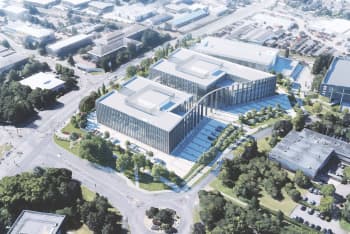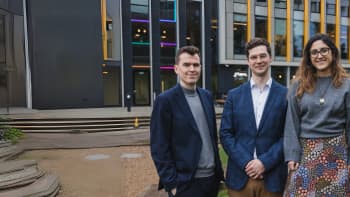An Experimental Spirit
Dr Layla Hosseini-Gerami on translating an early passion for chemistry into a new horizon for ‘abandoned’ drugs
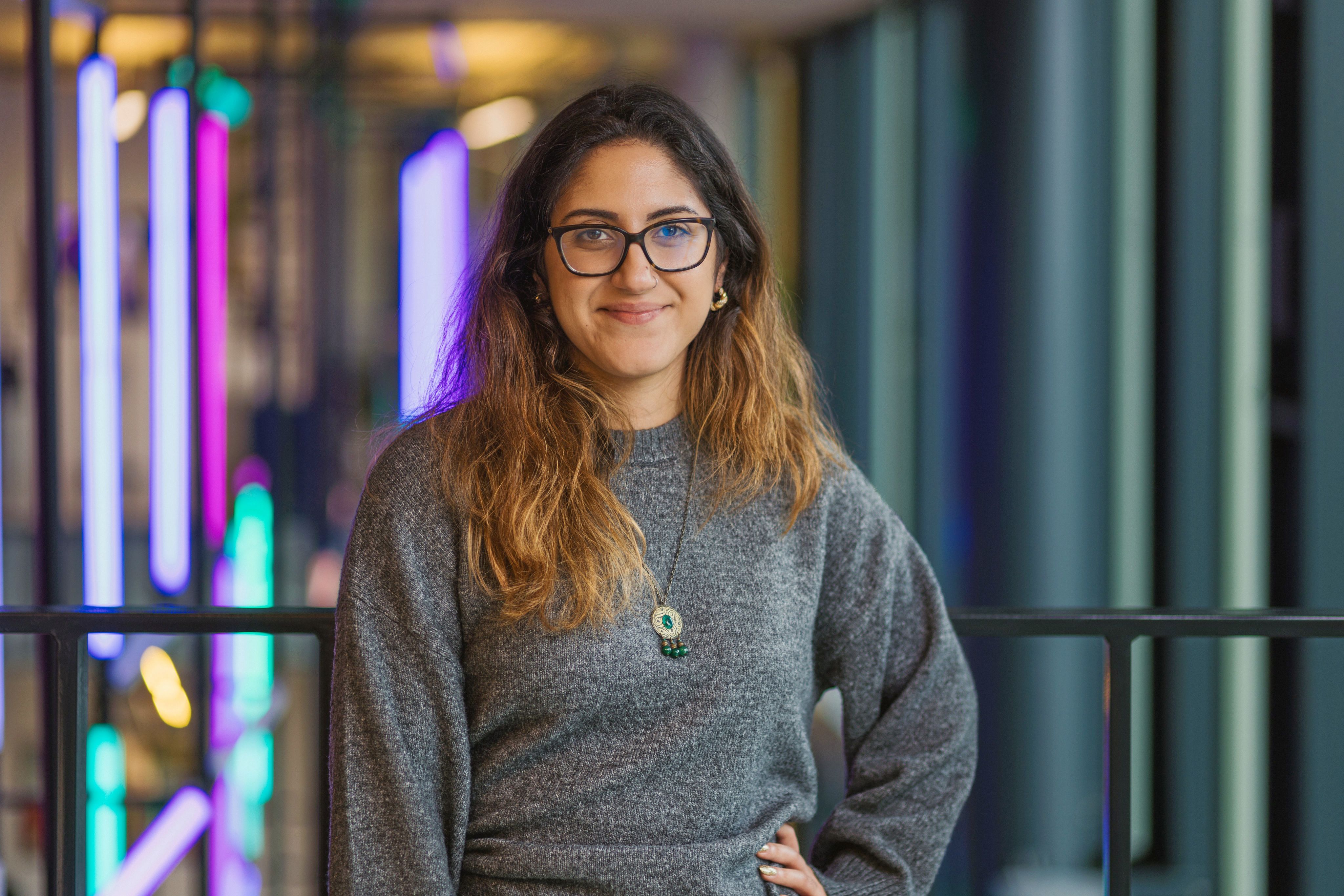
The AI pioneer shares her unique insights about Cambridge beginnings, inventive AI approaches, and the importance of mentoring.
Dr Layla Hosseini-Gerami (Downing 2018) isn’t far from the news headlines these days.
The company she co-founded, Ignota Labs, is making waves in the innovation space at the confluence of chemistry, biology and artificial intelligence (AI).
With half of newly developed drugs not reaching the market because of safety concerns, Layla is using AI to ‘rescue’ these shelved medicines by identifying how they will affect the human body, how problem elements can be changed, and the impact of those changes on the drug’s effectiveness. This innovation aims to reduce research and development costs, speed up drug development, and provide new hope for patients.[1]
Dr Layla Hosseini-Gerami at a reception for Women in Innovation award winners and representatives from the artificial intelligence industry in the Prime Minister's Office, 10 Downing Street.
Dr Layla Hosseini-Gerami at a reception for Women in Innovation award winners and representatives from the artificial intelligence industry in the Prime Minister's Office, 10 Downing Street.
This year her work has netted her a prestigious Women in Innovation award from Innovate UK, recognising her as one of 50 leading women entrepreneurs tackling critical challenges. This award supports her project to extend Ignota Labs' AI platform, SAFEPATH, to address drug safety disparities in diverse populations by integrating patient-derived genomic data. Traditional drug studies predominantly involve white male participants, leading to known oversight of toxicity risks in women and ethnic minorities.
Layla and Ignota are going from strength to strength, especially as the energy behind AI for social good gathers momentum.
How did the Downing alumna’s Cambridge experience position her for success? What’s the story behind the headlines and the accolades, what advice does she have for others in the AI space, and what’s the latest on her ongoing relationship with the Cambridge startup and biotech ecosystem?
We caught up with Layla, who filled us in on her Cambridge journey, as well as on the life of a busy young entrepreneur with a mission at the cutting edge of AI.
Downing College, Cambridge
Downing College, Cambridge
Layla with members of the Bender Research Group
Layla with members of the Bender Research Group
Layla working at her computer in April 2020
Layla working at her computer in April 2020
Members of Layla's research group before a formal meal at Clare Hall
Members of Layla's research group before a formal meal at Clare Hall
Ignota Labs founders at their first meeting
Ignota Labs founders at their first meeting
An education at an all-girls high school gave Layla an early taste of limitless exploration across topics, especially the sciences, with no disciplines discouraged because of gender. She took physics, chemistry, biology and maths at A levels, but:
"What drew me particularly to chemistry was the fact that it's the foundational science. It's the building blocks. It's cross-industry as well—chemistry is involved in everything from food to packaging to medicines to cosmetics. I found myself engaging with the subject and enjoying the practical experiments from a young age. I've always loved cooking, and I see a parallel between chemistry and cooking. I've even got a poster that says 'Chemistry is like cooking. Just don't lick the spoon’. Like putting different ingredients together to make something new, right? And that really appealed to me."
What inspired you to come to Cambridge and Downing for your PhD?
"‘During my undergraduate degree at Leeds, I wanted to do a year in industry. I was not enjoying the lab as much as I thought I would—long experiments at university were very different from my school days in the lab. But I knew I still loved chemistry, so I did a year in industry at a Cambridge-based company called Optibrium, a drug discovery software company whose software is used across pharma and other industries.
"I joined as a machine learning intern and that was the first time I had exposure to the computational side of chemistry—designing, analysing and understanding compounds. I loved it and I wanted to continue on that path. The CEO said, ‘You're going to have to get a PhD because it's a very specialised skill set. But I know a few professors here in Cambridge; go have a chat with them and maybe we can even sponsor your PhD."
Was a PhD a daunting proposition—especially as you hadn’t previously considered it?
"The first thing that came into my head was: how am I ever going to write a thesis? I hate writing essays! But my CEO reassured me that I would be writing so much it would actually be difficult to stay within the word limit. And he said, ‘Just go and chat with the different research groups that take your interest and see what you think.’ I didn’t feel any pressure.
"I was immediately drawn to the Bender group at the Department of Chemistry because of their application of AI to drug discovery, which had piqued my interest during my year in industry. I saw this as a great opportunity for me to hone my skills with a professor who is an opinion leader in this space and well known across the world. He and the group members were lovely, and the research sounded so interesting, with many opportunities to publish and present the work, and I could see myself in this environment."
What are stand-out memories or moments from your time in Cambridge?
"We were all independent researchers working on different things, but we loved spending time together, maybe going on pub trips after a long day of work. On a sunny day, we might suddenly decide—let's take the afternoon off and go punting. Having a coffee or a beer with my friends was very important. Burnout and mental health problems are very, very common with postgraduates, so it was a lifeline having such a supportive and amazing group of friends to spend some downtime with."
What did you learn from Cambridge that has influenced your career or helped shape where you are today?
"Collaboration is a big part of it. Obviously, Cambridge has very strong links to companies and to other academic institutions, so throughout my PhD I got the opportunity to do a lot of collaborative work.
"This has carried through to what we do at Ignota now—we're consciously very collaborative. Taking research and applying it to a real-life problem is not something that you often get exposed to during a PhD—you may be working on a very interesting theory, but it can be quite a long way from actual impact. It was special to have that experience throughout my PhD, being able to say I was co-sponsored by Eli Lilly, and having some of my work applied in their workflows. There were also startups that were collaborating with our group because they knew we were doing some interesting research , and they wanted to try it out with their drug programmes. So I was already getting the taste of ‘startup life’ and embedding the importance of collaboration."
"The entrepreneurship environment within Cambridge was a tremendous influence. At Downing, they had an annual competition called Downing Enterprise where students pitched their ideas to a panel of Downing alumni judges for the opportunity to get investment for their startup. I was helping to run the competition, and that was eye-opening for me—not to mention truly inspiring because I was seeing amazingly talented students come in with bright ideas, figuring out how to commercialise them and learning how to pitch and network."
Regarding biotech startups, and AI and the biotech industry, is AI playing an increasingly pivotal role in biotech and what excites you the most about this intersection?
"The amazing thing is the explosion of data that's happening right now—something that would be impossible for a human alone to look through. AI means we can uncover patterns that a human wouldn't be able to identify and gain new insights, even using historical data that we haven't derived insights from yet. If AI is used in the right way, it can streamline many processes.
"There's a lot of hype within the AI drug-discovery sphere. We had a massive explosion of AI in biotech, particularly back in 2020. Over the next few years, I think that we're going to see what the impact is within the industry. Who's going to still be standing? What technologies are going to rise to the top? What does the post-hype AI biotech space look like? I’m looking forward to finding out."
What are some of the key challenges of integrating AI into biotech, and how do you feel they should be navigated?
"The first thing would be lack of data—both amount, and range. It's presently very siloed. There's a lack of big, centralised data sets within this field and it's something that companies need to be more open to sharing.
"There's obviously competition between companies. It needs a mindset shift: if we share our data then everyone benefits, and the field can progress. There was one consortium that was looking at anonymous data sharing between different pharma companies and that was successful in showing that all the companies could benefit from each other's data without seeing the data and having sensitive information leaked. More initiatives like that would be key."
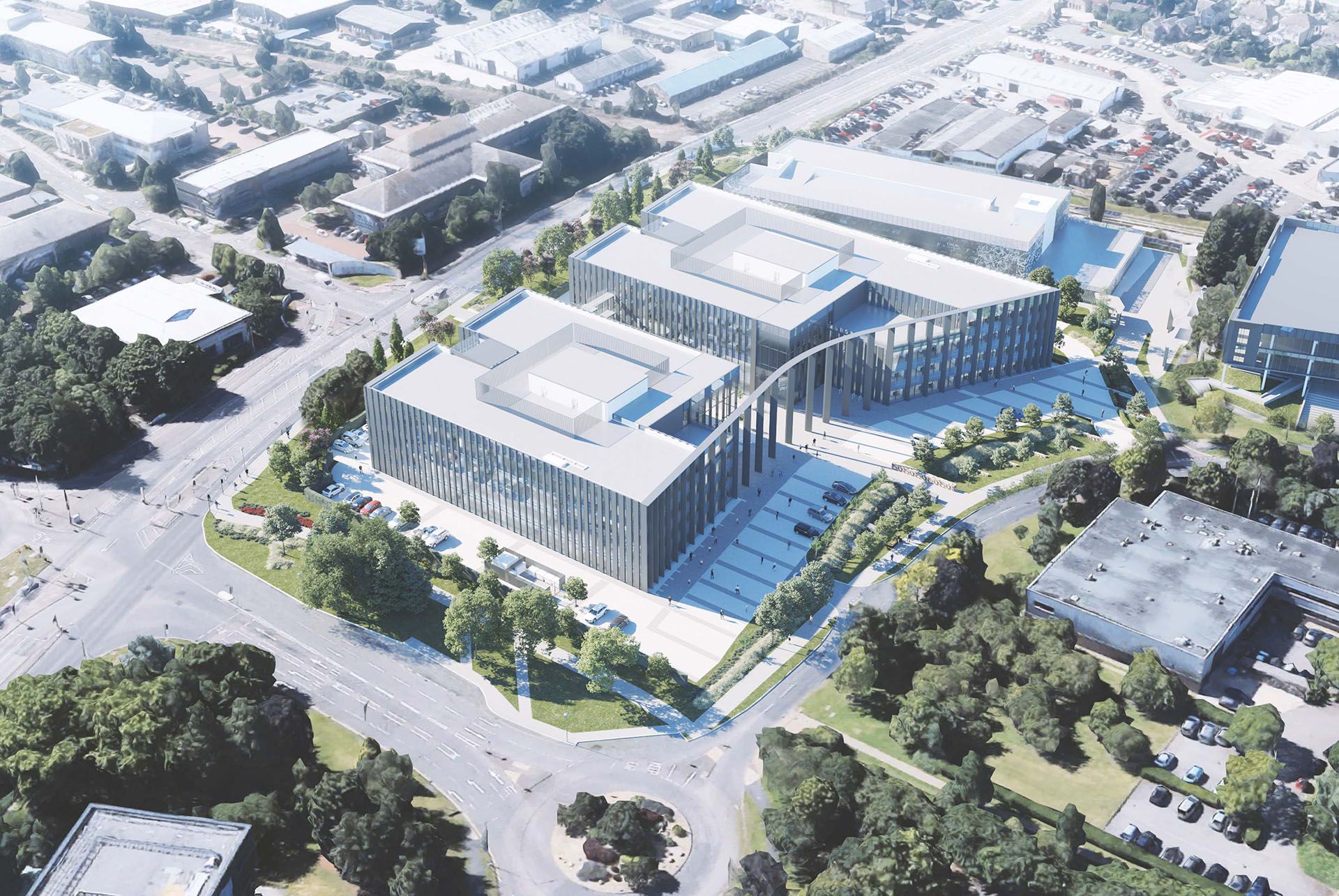
Where do you see AI transforming biotech the most in the next 5 to 10 years? Are there any emerging trends that particularly excite you?
"We are in a new wave of AI-enabled biotech. I would consider the first wave to be: AI is going to help us do drug discovery faster and cheaper, and more efficiently from end to end. What's starting to emerge now is increased specialisation within drug discovery. Different companies will develop niche AI expertise and collaborate as needed, which is a new way to conduct business in the industry. For example, understanding a toxicity issue with a failing drug is Ignota’s specialty. If we needed to work in early drug discovery, we would work with a company that specialised in this rather than trying to do it ourselves."
You've spoken about industry-wide biases in the AI biotech industry. Can you share an example that highlighted this challenge for you?
"The starkest thing for me is the number of times I'm in investor meetings or at a networking event for AI leaders and I'm the only woman. Because I started this job straight out of my PhD I'm often also the youngest in the room, which compounds the challenge. I don't see anyone here who looks like me. Am I really supposed to be here?
"We're getting better at improving diversity in AI in more junior roles. The drop-off happens in leadership roles. A lot of these strategies aim for a certain quantitative amount of diversity within the company, but they are likely to still have a board made up of white men. The translation to the top of the companies isn't happening. There needs to be more conscious initiatives at the board level, by investors, to resoundingly advocate for a woman's voice to be in the room."
Layla at work in the Ignota Labs office
Layla at work in the Ignota Labs office
How have you built resilience and confidence in leadership roles, particularly in a field where women are underrepresented?
"For me, it was about learning to challenge the voice in my head that said I can't do it or I'm not good enough, and reminding myself of evidence against that assumption. It’s important to have a good support network: I can be totally open with my co-founders.
"You can build confidence by attending networking events and putting yourself ‘out there’. Confidence doesn't magically appear just because you're an expert in something; you don’t necessarily feel comfortable communicating about it. When you feel uncomfortable, it’s a clear sign and a great opportunity: if I can push through this discomfort, I'll grow in some way."
What skills do you think are critical for young professionals entering the AI or biotech industries?
"Communication is a massive one when you're in a startup. You must be able to communicate things that are very complex and niche to investors, or to customers who know that your technology can solve an issue they have, but they want to understand how it works. Academia tends to encourage a very scientific, inaccessible way of speaking that you have to unlearn. You must be able to pick up on subtle cues from your audience and respond: ‘OK, I don't think they're quite getting it. So let me really break this down. Let me go back.’’
What advice would you give to other women wanting to pursue a career in AI adjacent industries?
"A mentoring community is crucial, and speaking with other women who are AI founders is extremely valuable. A peer-to-peer connection is also important in learning from others’ experience, especially regarding how to get started. You do have to put yourself out there: as women, we often hesitate and think 'Oh, I'm not quite ready yet'. At some point, we have to say: I need to go for it and see what the reaction is."
Ignota is now based in the Cambridge Science Park and is taking full advantage of the unique Cambridge biotech and innovation ecosystem in the company’s quest to revive promising drug candidates. Would tapping into that ecosystem be part of your advice to Cambridge students and alumni interested in the AI-driven startup space?
"Very much so! Especially around student entrepreneurship. For example, King's College has the Entrepreneurship Lab, where I gave a talk recently. Get involved with initiatives like that, because not every university has this dynamic, proactive, and supportive environment.
"Our offices were initially in London. After the first year, we asked ourselves: where do we want the company to be? And then that's why we landed on Cambridge—there is an incredibly strong base of science and AI talent focused around drug discovery, and the amount of support for growing startups within this industry is amazing. We saw that as unique to Cambridge."
What are your personal and professional aims for the future?
"Expanding Ignota labs. We're in an exciting phase where we've closed our seed round for £5.5M to grow our platform and pipeline. We are working with our portfolio of drugs to confirm solvable toxicity issues. I am looking forward to demonstrating the positive impact of our technology, getting our name out there, fixing more drugs and helping more patients.
"Personally, I am excited to do more mentorship. That's something I've wanted to get involved with more, but we haven't been able to offer work placements until now, being such a small company."
What one piece of advice would you give to your younger self?
"Trust in yourself and your abilities. And don't let that voice in your head convince you that you're not good enough. Because you are."
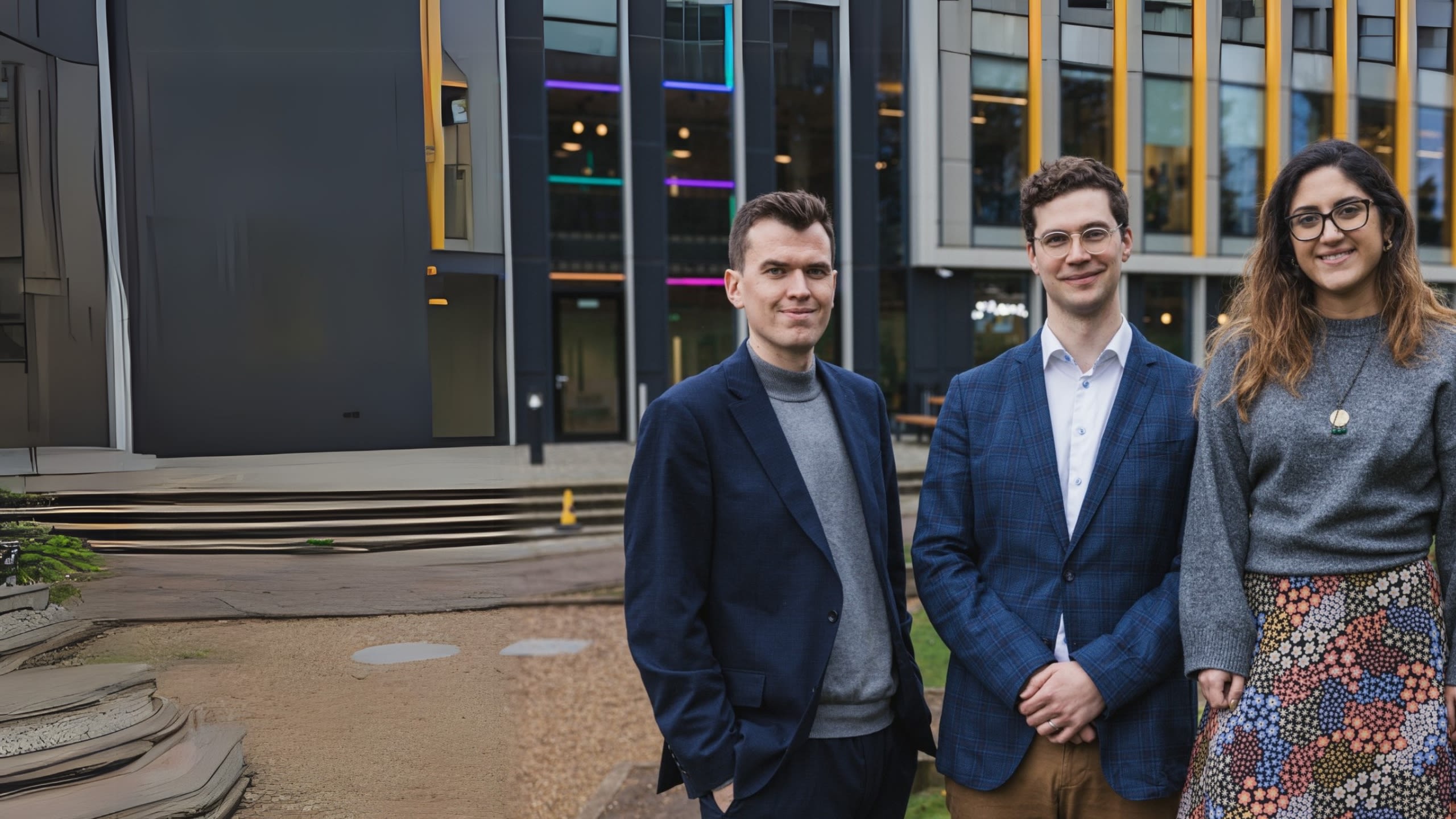
Discover how Cambridge is shaping AI for everyone
The power of AI is in how it serves the communities who need it most
Society is at a critical juncture where AI could help deliver solutions to complex challenges like climate change, healthcare accessibility and educational inequality. Fortunately, Cambridge alumni like Layla are leading the charge, bringing unique capabilities and leading-edge expertise to improve all our tomorrows.







